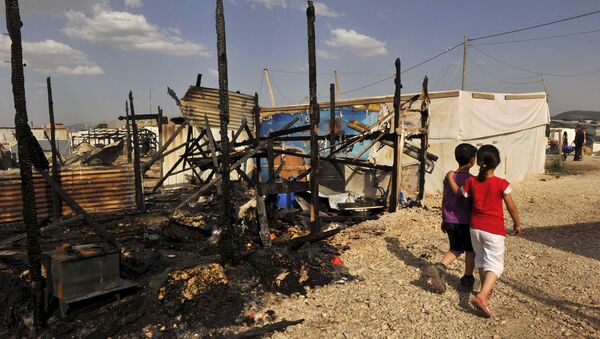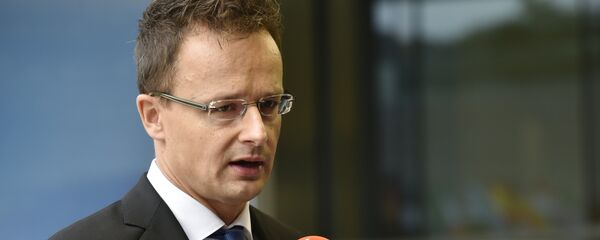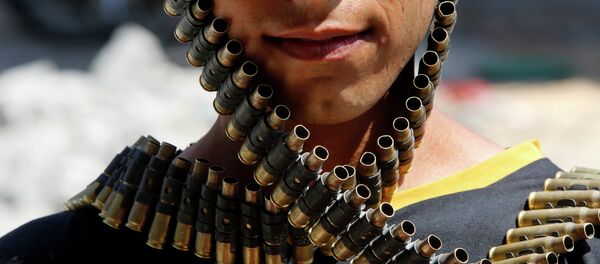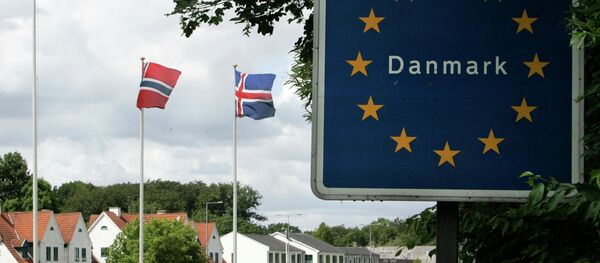BEIRUT (Sputnik) — A RIA Novosti correspondent met with refugees from the Christian Assyrian community in the Lebanese capital of Beirut and visited several camps in northern and eastern Lebanon, where Syrians, living without basic necessities, are going by their dream of starting a new life in Europe. They do not wish to return to their home country, much of which has been captured by the Islamic State (ISIL) Sunni jihadist group, notorious for its violence.
RETURN HOME — A DEATH SENTENCE
Just north of Beirut, there is an Assyrian Christian neighborhood that is home to the smallest community in Lebanon. During a visit to the abbot of the Assyrian Church in Lebanon, I was fortunate enough to meet a Syrian refugee named Ashur from the northeastern Syrian province of Al-Hasakah.
Ashur, 40, fled from Syria to Lebanon with his wife and daughter after ISIL militants attacked him, beating him up and leaving him to die at the side of a desert road.
"Now I have a disability," Ashur said. "The guys from a neighboring village, who were with ISIL, stopped me as I was leaving the village in a car headed for the city of Al-Hasakah. They knew me and they also knew that I had a profitable business. They took my car and all my valuables, beat me up and left me to die. I ended up in a hospital in Al-Hasakah. I couldn't walk for three months."
Before taking off, one of the ISIL militants said "run to the edge of the world, kafir [infidel in Arabic]. Otherwise, the next time I see you, you’ll be dead."
Ashur, with his wife and daughter, are staying with his close relatives in a four-bedroom apartment that is home to 18 people.
Prior to the war, Ashur and his brother ran a successful business selling construction materials in Syria. Ashur's older brother said that during the times "before the crisis" they helped Assyrians who had fled from Iraq.
"Now, I'm just a loader, and Ashur has a disability and is unemployable," the brother said.
Ashur says he wants to live with a cousin who is in Germany. He sees no future for his daughter in Lebanon and cannot think about having more children until his future is certain. However, he and his family speak with gratitude of the Lebanese people.
"We understand that they have many problems here," Ashur said. "I’m grateful to them for letting us live here at least for a little while." He is sure that as soon as he gets to Europe, he will "have rights," which will instill confidence in the future.
In May, the Lebanese authorities decided to no longer let Syrian refugees into the country. After lengthy negotiations, they made an exception for members of the Assyrian community.
A representative of the Assyrian Church of the East in Lebanon later explained to me that the authorities agreed to this compromise because the Church's Patriarch vowed to take care of every refugee with the support of the diaspora in other countries, including Russia, the United States and Australia. This pledge secured Assyrians' permission to continue to cross the border, provided they can produce a baptismal certificate.
After meeting Ashur I was curious to learn what the Lebanese themselves think about the refugee crisis. I spoke with some people in Beirut and realized that the Lebanese are very concerned by the issue.
One in two people argued that because Syrians agree to work practically for free, unemployment in Lebanon shot through the roof. Those who do not want to find a job engage in criminal activities. However, Beirut residents are mostly scared that radicals are entering their country together with the refugees, and are attempting to recruit the young Lebanese to destabilize the situation in the country, as they did in Syria.
I had my first look at the life in Lebanese refugee camps in the the Bekaa Valley, near the Syrian border. Here people who have fled the war are receiving aid from various international organizations, including the UN refugee agency UNHCR. However, in practice, financial assistance and supplies from other states are catastrophically insufficient.
There are about 30 makeshift tents in Camp No. 003. Several families with a large number of children live in each tent.
"There is no work. There is… nothing. All we can do is produce children," Abu-Khasan, an elder in one tent, said, jokingly.
Over the past year, their camp has received aid only twice, in the form of food and soap.
"There is no future for us here. Young men take a risk and work illegally. They heard that life is better in Europe, so they’re trying to earn money to go there," he said.
During the peak of the Syria crisis, refugees were issued IDs from UN agencies. As of late, IDs stopped being issued, while Syrians have no funds to obtain a Lebanese temporary residence permit, which costs $200 per person. Lebanese police detain undocumented people outside the camps and they face deportation or arrest.
Sitting on a mattress in the tent, Abu-Khasan said that each day in the camp is like every other day. He does not watch the news, but only waits for peace to come to Syria. He regrets the fact that his children, as well as his neighbors’ children, are not receiving any education or medical care.
"We’re not to blame for the fact that Islamists have come to our country. I have four children who were born in Lebanon and have not been registered anywhere. Should something happen, no one will know that they ever existed," he said.
Abu-Khasan said he does not blame the Syrian leadership for what has happened and does not support those who have unleashed the war in his country.
After an hours-long conversation, it became clear that he simply wants his family to live in decent conditions, particularly, wants his children to return to their motherland and live there in peace.
SCORCHING HEAT AND CHILDREN’S TEARS
Our trip to Bekaa ended at a refugee camp in Akkar District in northern Lebanon. Unlike Beirut Christians, most refugees here are Sunnis from the Syrian provinces of Al-Raqqah, Deir ez-Zor and Homs.
"We have nothing, and no one is helping us. Sometimes we manage to make a little money, and our elder children beg in the city. This is the only way to get enough money for food," Muhammad said.
Back in the Syrian city of Al-Raqqah, he used to be an ordinary farmer. He was far from being wealthy, but he and his family did have access to free healthcare and education, and they ate well.
"All hell broke loose when the terrorists once came and made our life intolerable. Trust me, it’s better to drink dirty water on this garbage heap in Lebanon than to a live under the Daesh [ISIL] laws," Muhammad said.
Muhammad and his family were lucky to escape from Al-Raqqah and safely reach the Lebanese border, which is about 435 miles away from the city. They walked by day and slept in a desert, or in abandoned houses, fearing the terrorists would find them all along.
A child is lying semiconscious in one of the refugee tent’s "rooms" in Akkar District. The kid fell ill at night. He is now running a fever and is in and out of consciousness. The refugees have no quota for free medical assistance, and Muhammad has no money to pay for his son’s treatment.
"We can only pray that Allah helps our boy get well," the father says quietly, stroking his son’s hot forehead.
We called a nurse from an international organization that helps refugees in Lebanon, who said the boy’s condition was very serious and that prayers alone would not save him. We convinced Muhammad that he must take his son to a clinic, assuring him that he would not have to pay for the visit. Fifteen minutes later, Abdullah was in a private clinic.
Physician Ali Khalil told us that they boy needed emergency assistance. Since they did not have the necessary equipment, Ali risked giving the boy an injection to bring the fever down.
"I can’t give him antibiotics because we have no diagnosis. I can only assume that it’s a water-borne infection," the doctor said.
As we walked out of Abdullah’s room, the doctor told us that many children there get ill from contaminated water and get heat strokes. Some children die, because their parents have no money, and seldom bring their children to clinics in time.
"Such fever can provoke irreversible brain processes. You must monitor the boy for a day," Ali Khalil told the father. "Be sure to bring him back immediately if he gets any worse. I promise that we’ll do our best to help him free of charge." He also gave the father a small package with medicine.
It was a silent drive back to the camp. We stopped only once, to buy a day’s stock of bottled water for cooking and drinking.
Two days after our trip to Akkar, a member of an international rescue organization showed us the boy’s photographs and said she saw Abdullah running merrily around a tent. But the future of this four-year-old boy and other Syrian children is not at all assured.






